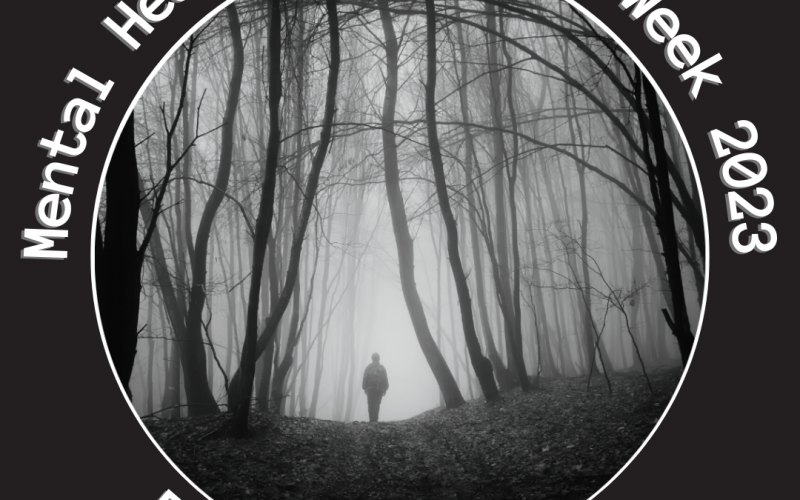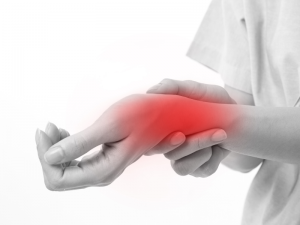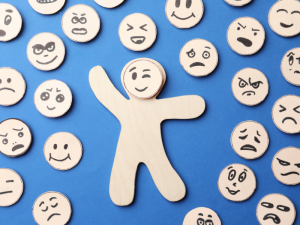Mental Health Awareness Week is a yearly opportunity to increase our understanding of mental well-being and stamp out the stigma. around mental well-being. This year’s theme is Anxiety and what we can do to prevent and manage it.
Anxiety is the body’s natural adaptive mind-body reaction to perceived and genuine stress or future danger. It is part of our fight-flight or freeze-response protection system; it can be mild, severe or unpredictable affecting everybody; differently, but sometimes it can get out of control and become a mental health problem.
Our vulnerability to anxiety and reactions to stressful events are individual and influenced by many factors, including genetics, social environment and previous life experiences. We all know people who seem super relaxed about almost everything and others who react strongly to the slightest stressor.
 In most cases, there are triggers for anxiety, such as increased stress, relationship breakdown, job loss, or another significant life event. Another important cause is an inability to get our basic emotional needs met. If we don’t know how to cope with our anxiety, it can get out of control and stop us from doing what we need or becoming a mental health condition.
In most cases, there are triggers for anxiety, such as increased stress, relationship breakdown, job loss, or another significant life event. Another important cause is an inability to get our basic emotional needs met. If we don’t know how to cope with our anxiety, it can get out of control and stop us from doing what we need or becoming a mental health condition.
Anxiety symptoms can vary from person to person; commonly, they include excessive worry, restlessness, irritability, difficulty concentrating, and physical symptoms such as sweating, trembling rapid heartbeat, and shortness of breath. Medical professionals categorise these difficulties as anxiety disorders, including:
Anxiety disorders
- Generalised anxiety disorder (GAD) – is when a person struggles with increased anxiety and worries daily; GAD can be mild or severe.
- Panic disorder – is an exaggerated recurring type of fear response where people regularly have sudden intense episodes of fear with distressing and frightening physical symptoms. For someone with a panic disorder, feelings of anxiety, stress and panic occur regularly and at any time, often for no apparent reason.
- Phobias – an overwhelming and debilitating fear of an object, place, situation, feeling or animal. They develop when someone has an exaggerated or unrealistic sense of danger about a situation or thing.
- Social anxiety disorder, also called social phobia, is a long-term and overwhelming fear of social situations. Commonly it starts during the teenage years and, for some people, gets better over time. It can be very distressing and significantly impact life; those affected experience excessive shyness and unease around strangers and peers that becomes so extreme that it interferes with normal social development and leads to isolation, as meeting new people and attending social gatherings brings up feeling about others judging or scrutinising them. While they know their fears are irrational, they feel powerless to overcome them.
- Obsessive-compulsive Disorder (OCD) – is a condition where a person has obsessive thoughts and compulsive behaviours. OCD can affect all ages and genders, with some experiencing symptoms as early as age 6, yet, typically, onset begins around puberty and early adulthood.
- Acute stress disorder – acute stress disorder can develop shortly after a traumatic event causing significant anxiety and flashbacks. Symptoms usually subside within 3-4 weeks.
- Post-traumatic stress disorder (PTSD)– similar to an ‘acute stress disorder’ but the symptoms persist for much longer, significantly affecting a person’s day-to-day life (more later)
Although anxiety is a typical experience, it can become problematic when it leads to excessive fear, hypersensitivity to threats, and unhelpful behaviour change. Dealing with anxiety can be challenging because although the safety behaviours alleviate anxiety in the short term, it can worsen anxiety over time if anxious predictions are never challenged.
Getting help
The good news is there are often simple steps to manage these feelings and symptoms; a variable toolbox exists so folks have choices, including talking therapy, medication and lifestyle strategies, but for those with ongoing or worsening symptoms, seeking help from a mental health professional is often the best way forward, speaking with your GP is usually the way forward to help.
Talking therapy
There are many types of talking therapy, the trained professional aim to:
- Offer a non-judgmental space and time to speak and be heard.
- Support folks to understand yourself better and make sense of your feelings and thoughts.
- Help people resolve complicated feelings or find ways to live with them.
- Assist in recognising unhelpful patterns of thinking or behaviour and, if folks choose, find ways to change them.
Medications
Depending on the symptoms and severity, anti-anxiety or antidepressant medications can help manage symptoms in the short term.
10 evidence-based anxiety management tools.
- Self-care: Taking care of yourself is essential for managing anxiety. Regular exercise can help release endorphins and natural mood boosters to help reduce muscle tension and stress. For some, avoiding stimulants such as caffeine, alcohol, and smoking is also helpful. Getting enough quality sleep, eating a healthy diet, or journaling can also help buffer stress.
- Controlled breathing aims to reduce physiological symptoms by regulating breathing. It involves breathing deeply into the lower abdomen for a few minutes. Try breathing in for a count of 4, then breathing out for a count of 6, repeating for at least a few minutes.
- Progressive muscle relaxation – aims to ease the bodily sensations of anxiety, such as muscle tension. Give this a go – tense and relax each muscle group, working progressively up the body from feet to face.
- Visualisation – calming imagery is the idea of building an image of a calm, safe place to soothe the anxiety response and distract from anxious thinking. Choose YOUR safe place (forest, beach, or favourite walk).
- Distraction– you can divert your brain from anxious thoughts by refocusing on something else or another activity, such as your favourite hobby. This can empower folks to use their strengths and interests as valuable anxiety tools.
- Challenge your thoughts– involves identifying evidence for and against anxious thoughts. The aim is to weigh this evidence and then reframe the idea as a more balanced view of the situation, moving away from anxious predictions.
- Compassionate self-talk -do you know anxiety partly stems from self-criticism, such as believing you do not have the skills to cope? Kind self-talk can help reduce self-criticism and anxiety.
- Worry time – allocating specific worry time has been shown to reduce worrying and rumination. Even just 5–10 minutes per day.
- Social support: Talking to friends and family about your anxiety can help you feel less alone and more supported. Joining a support group or seeking a therapist can provide valuable support and guidance.
- Avoid triggers: Identifying and avoiding triggers that contribute to anxiety can also help folks manage symptoms, including avoiding certain situations or people or limiting news or social media exposure.

Additional strategies that may be helpful:
- Social support: Talking to friends and family about your anxiety can help you feel less alone and more supported. Joining a support group or seeking a therapist can provide valuable support and guidance.
- Mindfulness: techniques like deep breathing or meditation can help calm the mind and reduce anxiety; these techniques are easy to learn and can be practised anywhere and anytime. Caution: techniques such as mindfulness or meditation may not be advisable without supervision for people with acute stress disorder or PTSD.
- Applied relaxation – focuses on relaxing muscles in a particular way during situations that usually cause anxiety.
It’s important to remember that anxiety is a normal response, and everyone’s experience is different and changeable; what works for one person may not work for another.
Support
Anxiety Care UK – anxietycare.org.uk
Rethink Mental Illness – rethink.org
Anxiety UK –anxietyuk.org.uk







